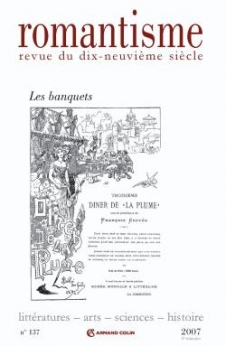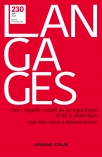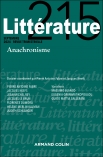
Romantisme n° 137 (3/2007)
Pour acheter ce numéro, contactez-nous
Recevez les numéros de l'année en cours et accédez à l'intégralité des articles en ligne.
Si l’appel de l’Ailleurs, vieux comme tous les rêves d’Arcadie ou d’Eldorado, n’a pas attendu le romantisme pour se manifester, il est de fait qu’un changement radical dans l’état du monde coïncide avec son moment historique. Telle page du finale des Mémoires d’outre-tombe note (avec nostalgie) qu’« il n’y a pas un coin de notre demeure qui soit actuellement ignoré », ce qui exclut qu’on puisse encore explorer (même si la colonisation de toute la terre ne s’est pas encore techniquement achevée), mais ce qui engage à ce que se déploie sur un tout autre plan – métaphysique et métapsychique – un désir d’Ailleurs. Je voudrais en rendre sensible les maux au travers d’une oeuvre qu’on n’a pas l’habitude d’envisager sous cet angle : celle de Mallarmé, qui s’en trouve me semble-t-il littéralement hantée. Si l’ensemble de la poétique mallarméenne subit la profonde réorientation de la double découverte du « Néant », puis de « la Beauté » au printemps et à l’été 1866, autrement dit, si Mallarmé fait la découverte de l’écroulement du suprasensible sur quoi fonder métaphysiquement la valeur poétique, c’est aussitôt la croyance toujours obscurément néoplatonicienne (et du même coup aisément christianisée) en une remontée jusqu’à un Ailleurs originaire qui, retrouvé, permettrait au sujet de réintégrer sa part divine, qui s’effondre.
If the call of the Elsewhere, old as all the dreams of Arcadia or Eldorado, did not await the coming of Romanticism before manifesting itself, it is true that a radical change in the state of the world coincided with its great moment in history. A page of the final section of Mémoires d’outre-tombe notes (with nostalgia) that “there is not one corner of our dwelling place that is at present unknown”. That situation excludes the possibility that we can still explore it (even though the colonization of the whole of the Earth had not yet been technically completed), but it makes it inevitable that on a completely different level – metaphysical and metapsychic – a desire for Elsewhere unfurls. I would like to make perceptible the sorrows accompanying this process in a body of work that is not usually looked on from this angle: that of Mallarmé, which to me seems literally haunted by this. If the poetic works of Mallarmé as a whole undergo the profound reorientation of a dual discovery, of “Nothingness”, then of “Beauty” in the spring and summer of 1866 or, in other words, if Mallarmé makes the discovery of the collapse of the Suprasensory sphere on which poetic value can metaphysically be founded, it is still the obscurely neoplatonic (and hence easily Christianized) belief in an ascension back to an original Elsewhere – that would, once returned to, allow the subject to reincorporate the divine part of his being – which collapses.

